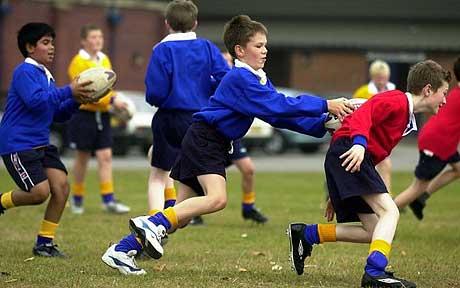It is alarming the way parents and schools ignore sport activities for they children beacuse of education,yes everyone knows that education is the best thing a child needs,but the way things are going now parents and schools don't give the children even a minute for them to have some sports
It is believed that a healthy body has a healthy mind. Anyone who has seen kids on a playground knows they are the happiest moving about, active and playing. Whether it is playing informally, competitive play or even playing just for fun.
However, present day education is largely academic. Persuasively, this positioning needs to be changed for a balanced development through inculcating a health consciousness among students. This includes development at physical, social and mental levels. With increasing emphasis on academics everywhere and rapid advances in science and technology, parental pressure has been driving academic training; albeit at the cost of health and physical fitness of the youth.
As per a study published in the British Journal of Sports Medicine, levels of physical activity may start tailing off as early as the age of seven. As children get older, it can be a challenge for them to get adequate daily physical activity. Hence, parents along with schools must take initiatives to inculcate a culture of ‘playing’ from early childhood of a student so that it follows them throughout their lives. Parents and schools should team up to encourage sports among children. As higher percentage of children go to schools, in this context there is now an urgency to lay a strong foundation and strengthen physical education and sports in education institutions or schools. With constant support from parents, this calls for the integration of physical education, sports and other recreation activities in schools for creating a healthier generation.
But why should we take steps to encourage physical education and sports?
As stated earlier, it is a well-known fact that children are the happiest when they play. Playing has physical, social, psychological and academic benefits for children. Regular physical activity also provides numerous health benefits for children. Let’s chalk out all the reasons:
Better academic performance
The relationship between mind and body has been acknowledged scientifically. Research has proven repeatedly that physical activity can have an impact on cognitive skills and attitudes and academic behaviour, all of which are important components of improved academic performance. These include enhanced concentration and attention as well as improved classroom behaviour.
Helps to forge character
When children play with others or play team sports, it creates a sense of belonging in them and encourages them to work with others. It teaches them how to accept a win or lose graciously - building a strong team spirit within. A win – win situation indeed!
Promotes a healthy lifestyle
Today’s children may fantasise about growing up to be svelte celebrities, athletes, etc. The irony however, is that children are largely inactive and unhealthy due to the sedentary lifestyles they are leading. Sports and physical education is the best cure for children to lead a healthy lifestyle. Regular physical activity helps control or reduce the risk of chronic diseases, such as heart disease, hypertension, diabetes and osteoporosis and improves their metabolism. Children who are physically active are more likely to grow into physically active and emotionally balanced adults.
Teaches life skills
By making physical education and sports more engaging and inclusive, one can make children learn respect for themselves and for others. It also teaches them team building skills, critical and creative thinking thereby making them more participative and responsible beings.
Holistic Education
Physical education and sports is an important part of holistic schooling. Physical education as an education tool can contribute significantly to the development and learning progress of children. It acts as a balance between a student’s body and mind and hence schools and parents must give their children sufficient time to play for their all-round development.
Across the globe, implementing sports education programmes is a huge challenge, considering the various constraints we are faced with. Parents and schools together can contribute to the monitoring and support required to keep up momentum of play and sports culture. It is known that children spend a significant amount of their time in schools. The school therefore is proven to be the best place to introduce changes in the way sports or physical education is handled. Schools come with a package of a play area, infrastructure, friends, teachers, etc. and hence provide the best environment to get children to play.
Parents can contribute by encouraging their children to increase their physical activity to improve their health and displace unhealthy behaviours. Parents can assess the physical activity patterns of their children to help refer them to the appropriate physical activity programmes the school is offering. But their role shouldn’t just be limited to supporting and encouraging their children to be physically active but by being physically active role models themselves. It’s a fact, children who lead active lifestyles are likely to remain active as adults and pass on their healthy lifestyle habits to their own children. Thus, parents who endorse and persuade to be physically fit in their own lives are more likely to pass on these good habits to their children.
Adopting a sports culture in early levels of childhood clearly is a significant step. However, to attain this paradigm shift towards physical education and sports, it is of vital important to encourage the acceptance of this sports – oriented culture by parents, schools and community at large, which requires a collaborative effort. Like it’s said in sports, talent wins games, but teamwork wins championships. Together everyone achieves more.
Have to stop here but they are alot of reasons why education is important to kids,i hopr parenta on these platform for and teachers will put these on to consideration.

Comments